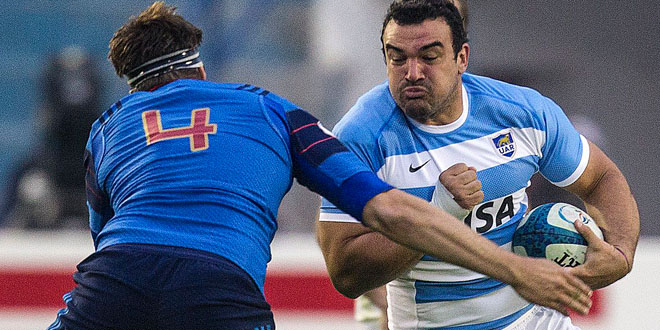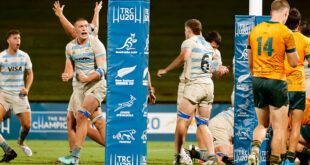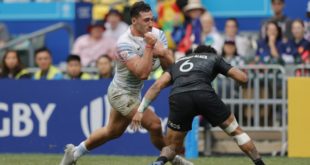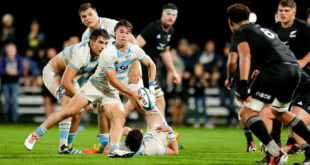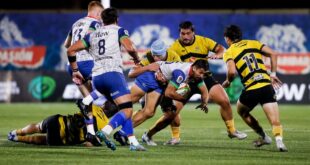At the age of 31 Argentine Agustín Creevy will lead out Los Pumas in his 50th appearance on Saturday. He will do so at Mbombela Stadium in Nelspruit, a new venue and city for the Rugby Championship. In his 22nd match as captain Creevy will become the 26th Puma to reach the milestone.
Early Years
Creevy took some 11 years to reach the mark. By way of comparison his teammate, Tomás Cubelli, will earn his 49th cap tomorrow despite having debuted in 2010. In his early years what was standing in the way of Creevy was not the legendary Mario Ledesma. Instead it was the fact that Creevy was yet to be playing as a hooker.
From Greater Buenos Aires club of San Luis, Creevy was in fact a flanker. Having been an impressive young player he represented the Argentina u19’s in 2004 and then the u21’s in 2005 and 2006. Los Pumas Head Coach Marcelo Loffreda liked what he saw and selected him against Japan in 2005.
The fixture against the Japanese was ultimately a warm-up match for that year’s fixture against the British and Irish Lions. Creevy was one of a number of inexperienced home-based players called-up by Loffreda. For Creevy it was part of early investments into him that also included playing against South Africa ‘A’ in 2004, the New Zealand Heartland XV in 2006 and the Northampton Saints in 2007.
Performance attracted the interest of scouts with the result being a move to France to play for Biarritz. He joined the Basque club to play in the Top 14 from 2007-2009 only to then return home where he career would forever change.
From Flanker to Hooker
Having arrived back home from France aged 24 Creevy had just three caps. His second and third caps had come against Samoa and Uruguay in 2005 and 2006 and were on dates in which Loffreda could not select his top side.
His fourth cap would come in November 2009 when Phelan took him on tour to Europe. Argentina played against England, Wales and Scotland doing so with Ledesma being supported by Alberto Vernet Basualdo and Creevy as the third choice.
Vernet Basualdo had been back-up to Ledesma at Rugby World Cup 2007 and had gone on to have a successful career for Toulouse. With Ledesma missing the November 2009 test in Edinburgh through family reasons, Vernet Basualdo would start the test. His understudy was Creevy.
So swift had his transition been from flanker to hooker that as early as May 08 2009 Creevy was starting for the team now known as the ‘Argentina XV’. He played two matches against Namibia at hooker before facing the England Saxons the following month and subsequently the Churchill Cup which also included Canada and the USA.
By October it was clear that he was ready to be tested at the top level. He came through his final trial in the Americas Rugby Championship with flying colors as he impressed against the USA Select XV and the BC Bears.
Ledesma Deputy
In early 2010 it had become clear that Creevy was now the understudy to Ledesma. Vernet Basualdo would not play again for Los Pumas with Creevy being on the bench for all six of Argentina’s tests 2010. Throughout 2010 and 2011 he was groomed as the longterm replacement for Ledesma who would retire at the age of 38 following Argentina’s Quarter Finals exit from Rugby World Cup 2011.
Both at that tournament and in prior test matches Creevy had been a highly-effective replacement. His ball-carrying and work at the breakdown earned plenty of praise and had also attracted renewed interest from France.
In October 2010 Ledesma’s own club, Clermont, signed Creevy as a medical joker. The move did not result in significant game time but worked out for the better as he would go home in fine shape in early 2011.
Captaining the Pampas XV under Daniel Hourcade’s coaching Creevy led the team to the Vodacom Cup title. His leadership and individual performances gave Phelan the confidence to only take two hookers to Rugby World Cup 2011.
Following the tournament Creevy did not return to the Pampas XV but, rather, joined a third French club, this time Montpellier. He joined a number of Argentine players at the club and would go on to start a European Champions Cup fixture as one of six Pumas in the run-on side.
His first season at Montpellier had him singled out as the clear starting hooker for Argentina. Phelan was preparing his players for a the unknown as Los Pumas were to join Australia, New Zealand and South Africa in the inaugural Rugby Championship.
Guiñazú Deputy
Unfortunately an injury to Creevy in the build up to the opening Rugby Championship campaign saw him missing out. In his place Head Coach Santiago Phelan looked to utility front-rower Eusebio Guiñazú. Based on a solid performance against South Africa in his home town of Mendoza, Guinãzú would be retained at hooker ahead of Creevy for an extended period.
Phelan would go on to use Guiñazú as his starting hooker throughout the year. This gave Creevy the role of being an impact replacement. He proved to add a new dimension to Los Pumas game. Him being a converted flanker combined with Guiñazú also being a prop gave Argentina increased mobility.
This same mobility was what Montpellier put to such good use throughout the 2011-2013 and 2012-2013 seasons. During this period the Argentine was among the leading hooker in the Top 14 and made a name for himself through his capacity to stand and offload in tackles.
Phelan, though, would not budge and continued to place his confidence in Guiñazú. The extent of this was such that Creevy’s only start was against Australia in Perth in 2013. The match would be Argentina’s best of the second Rugby Championship as they lost 14-13. Heavy defeats in the following two matches led to Phelan stepping down.
Captaincy
Central to the resignation of Phelan were off field problems. Infighting between the coach and players ultimately led to changes. At the eleventh hour Daniel Hourcade was named as Argentina’s new Head Coach. He had just three weeks before his opening assignment against England in London.
With there being such a limited period of time Hourcade opted against making immediate changes. But with captain Juan Martín Fernández Lobbe injured he did nonetheless make one noteworthy selection. As captain he overlooked Patricio Albacete to instead hand the captain’s band to Juan Manuel Leguizamón.
With Albacete having been one of the leaders in the movement against Phelan Hourcade opted against the vice-captain taking over. Also contributing to the decision was the non-availability of Creevy who had been injured playing in the Aviva Premiership for Worcester just weeks before the tour.
Guiñazú thereby held on to the hooker position, starting against England, Wales and Italy. His deputy was under 20 captain Santiago Iglesias Valdez who would be then be the understudy of Creevy in 2014.
Hourcade succeeded in preventing 2013 from being a total disaster for Argentina. In the final match of the year Argentina won 19-14 against Italy in Rome. Hourcade had moved around several players, giving Argentina a different look that under Phelan. Of note was Juan Imhoff and Joaquín Tuculet both starting.
Fit again Creevy was unveiled as Argentina’s captain before the 2014 Rugby Championship campaign. He was the leader of a team no longer featuring a number of first choice players under Phelan. Albacete, Guiñazú, Santiago Fernández, and Julio Farías Cabello and Gonzalo Tiesi were all gone.
Some were gone for their part in the fall of Phelan while others were simply deemed to not be the best players. Hourcade quickly went about blooding new players with Argentine based players quickly finding their way. All of a sudden more opportunities presented themselves and a path was laid for Argentina to march towards the Semi Finals of Rugby World Cup 2015.
Creevy’s infield leadership during this period was crucial. History would be made due to the vision of Hourcade and the example of the captain. From the lows of 2013 Argentina recovered to beat Australia in Mendoza and France in Paris in late 2014. The following year Los Pumas would beat South Africa in Durban in a statement of intent which was followed by a fourth placed finish in the World Cup.
The Creevy era is now to being its third year. In it Argentina have already completed significant achievements. Now the team has set a goal of two wins in the Rugby Championship. On the horizon is a first-ever win over New Zealand. Crete’s career demonstrates a player who always aims high and never gives up.
 Americas Rugby News Rugby news from across the Americas!
Americas Rugby News Rugby news from across the Americas!
